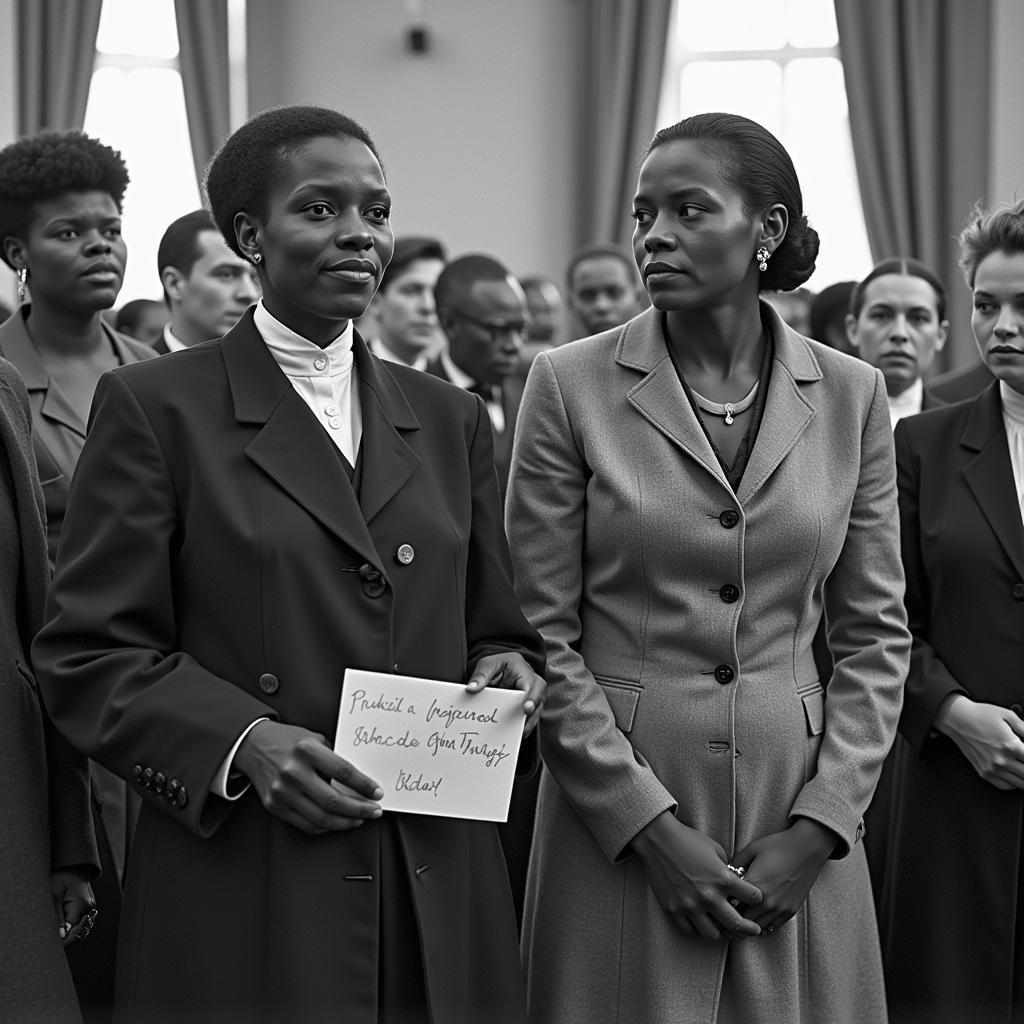African American Feminism: A Historical Perspective
African American Feminism is a distinct branch of feminism that centers on the lived experiences of Black women in the United States. While often interwoven with the broader feminist movement, it distinguishes itself by addressing the unique intersectionality of race, gender, and class that shapes the lives of Black women. This article delves into the historical context, key figures, and ongoing struggles that define African American feminism.
Roots in Resistance: From Slavery to Suffrage
The seeds of African American feminism were sown in the crucible of slavery. Denied basic human rights, Black women endured the horrors of forced labor, sexual exploitation, and the tearing apart of families. Yet, even in the face of such oppression, they resisted. Figures like Harriet Tubman, Sojourner Truth, and Ida B. Wells-Barnett emerged as powerful voices against slavery and racial injustice.
 Harriet Tubman and Sojourner Truth speaking at a women's rights convention
Harriet Tubman and Sojourner Truth speaking at a women's rights convention
The post-slavery era brought new challenges. Black women faced Jim Crow segregation, widespread lynching, and persistent economic inequality. Despite being instrumental in the fight for abolition, they were often sidelined within the emerging women’s suffrage movement, which frequently prioritized the needs of white women. This exclusion laid bare the need for a feminism that specifically addressed the concerns of Black women.
Defining Moments: The Rise of Black Feminist Thought
The Civil Rights and Black Power movements of the mid-20th century provided fertile ground for the articulation of Black feminist thought. Women like Ella Baker, Fannie Lou Hamer, and Angela Davis challenged both racist structures and patriarchal norms within their own communities and in broader society.
 Black women participating in a civil rights march, holding signs advocating for equality
Black women participating in a civil rights march, holding signs advocating for equality
During this period, Black women intellectuals began to formally define Black feminism. Writers such as Audre Lorde, bell hooks, and Alice Walker explored themes of intersectionality, challenging the notion of a singular feminist experience and highlighting the multifaceted nature of Black women’s oppression. They argued that race, class, gender, and sexual orientation could not be disentangled, shaping a distinct form of marginalization.
Continuing the Legacy: Contemporary African American Feminism
African American feminism continues to evolve in the 21st century, addressing contemporary issues such as mass incarceration, police brutality, economic inequality, and reproductive justice. The Movement for Black Lives, with its emphasis on intersectional activism, exemplifies the enduring legacy of Black feminist thought.
 A group of diverse African American women holding a banner that reads "Black Lives Matter" during a protest, with smiles and determined expressions on their faces.
A group of diverse African American women holding a banner that reads "Black Lives Matter" during a protest, with smiles and determined expressions on their faces.
Contemporary writers and activists like Michelle Alexander, Tarana Burke, and Brittney Cooper continue to shape the discourse around race and gender, challenging systemic inequalities and advocating for transformative change. Their work underscores the ongoing relevance of African American feminism in dismantling interlocking systems of oppression.
African American Feminism: A Global Impact
The impact of African American feminism extends far beyond the borders of the United States. Its emphasis on intersectionality has resonated with women of color around the world facing similar struggles against colonialism, racism, and patriarchy. Black feminist thought has influenced feminist movements in Africa, the Caribbean, and Europe, offering a framework for understanding and challenging the multifaceted nature of oppression.
Conclusion
African American feminism, born out of resistance and forged in the fires of social movements, remains a vital force for social change. Its focus on intersectionality, its commitment to social justice, and its celebration of Black women’s resilience continue to inspire generations of activists and scholars. By centering the voices and experiences of those most marginalized, African American feminism paves the way for a more just and equitable future for all.
